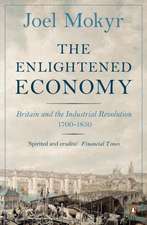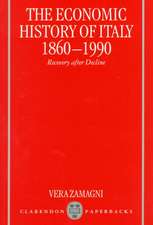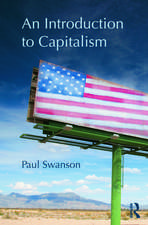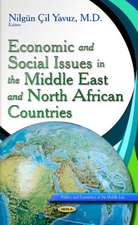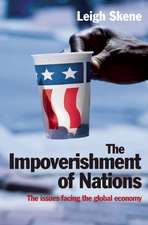Ideas and Economic Crises in Britain from Attlee to Blair (1945-2005): Routledge Explorations in Economic History
Autor Matthias Matthijsen Limba Engleză Paperback – 15 feb 2012
| Toate formatele și edițiile | Preț | Express |
|---|---|---|
| Paperback (1) | 486.42 lei 6-8 săpt. | |
| Taylor & Francis – 15 feb 2012 | 486.42 lei 6-8 săpt. | |
| Hardback (1) | 1167.31 lei 6-8 săpt. | |
| Taylor & Francis – 13 aug 2010 | 1167.31 lei 6-8 săpt. |
Din seria Routledge Explorations in Economic History
- 9%
 Preț: 934.31 lei
Preț: 934.31 lei -
 Preț: 154.74 lei
Preț: 154.74 lei -
 Preț: 309.99 lei
Preț: 309.99 lei -
 Preț: 389.40 lei
Preț: 389.40 lei -
 Preț: 309.12 lei
Preț: 309.12 lei -
 Preț: 326.97 lei
Preț: 326.97 lei -
 Preț: 379.05 lei
Preț: 379.05 lei -
 Preț: 312.65 lei
Preț: 312.65 lei -
 Preț: 310.84 lei
Preț: 310.84 lei -
 Preț: 325.09 lei
Preț: 325.09 lei - 8%
 Preț: 390.79 lei
Preț: 390.79 lei -
 Preț: 422.00 lei
Preț: 422.00 lei - 18%
 Preț: 1113.95 lei
Preț: 1113.95 lei - 25%
 Preț: 824.17 lei
Preț: 824.17 lei - 18%
 Preț: 1061.06 lei
Preț: 1061.06 lei - 21%
 Preț: 304.74 lei
Preț: 304.74 lei - 18%
 Preț: 1056.95 lei
Preț: 1056.95 lei -
 Preț: 419.50 lei
Preț: 419.50 lei - 29%
 Preț: 1193.01 lei
Preț: 1193.01 lei - 18%
 Preț: 1055.21 lei
Preț: 1055.21 lei - 18%
 Preț: 1175.51 lei
Preț: 1175.51 lei - 25%
 Preț: 766.65 lei
Preț: 766.65 lei - 18%
 Preț: 1433.54 lei
Preț: 1433.54 lei - 18%
 Preț: 1163.63 lei
Preț: 1163.63 lei -
 Preț: 484.47 lei
Preț: 484.47 lei - 25%
 Preț: 997.11 lei
Preț: 997.11 lei - 18%
 Preț: 1385.39 lei
Preț: 1385.39 lei - 25%
 Preț: 855.59 lei
Preț: 855.59 lei - 18%
 Preț: 1077.57 lei
Preț: 1077.57 lei - 18%
 Preț: 1166.80 lei
Preț: 1166.80 lei - 18%
 Preț: 1126.82 lei
Preț: 1126.82 lei - 28%
 Preț: 851.46 lei
Preț: 851.46 lei - 18%
 Preț: 1175.01 lei
Preț: 1175.01 lei - 42%
 Preț: 195.71 lei
Preț: 195.71 lei - 18%
 Preț: 1059.84 lei
Preț: 1059.84 lei - 18%
 Preț: 1057.05 lei
Preț: 1057.05 lei - 18%
 Preț: 1334.10 lei
Preț: 1334.10 lei - 43%
 Preț: 216.41 lei
Preț: 216.41 lei - 28%
 Preț: 822.54 lei
Preț: 822.54 lei - 18%
 Preț: 1168.09 lei
Preț: 1168.09 lei - 28%
 Preț: 1482.69 lei
Preț: 1482.69 lei - 18%
 Preț: 1164.92 lei
Preț: 1164.92 lei -
 Preț: 485.99 lei
Preț: 485.99 lei - 18%
 Preț: 1065.06 lei
Preț: 1065.06 lei - 18%
 Preț: 1058.79 lei
Preț: 1058.79 lei - 18%
 Preț: 1064.70 lei
Preț: 1064.70 lei - 26%
 Preț: 821.53 lei
Preț: 821.53 lei
Preț: 486.42 lei
Nou
Puncte Express: 730
Preț estimativ în valută:
93.08€ • 99.53$ • 77.61£
93.08€ • 99.53$ • 77.61£
Carte tipărită la comandă
Livrare economică 18 aprilie-02 mai
Preluare comenzi: 021 569.72.76
Specificații
ISBN-13: 9780415533430
ISBN-10: 0415533430
Pagini: 272
Ilustrații: 15 Tables, black and white; 16 Line drawings, black and white; 16 Illustrations, black and white
Dimensiuni: 156 x 234 x 15 mm
Greutate: 0.39 kg
Ediția:1
Editura: Taylor & Francis
Colecția Routledge
Seria Routledge Explorations in Economic History
Locul publicării:Oxford, United Kingdom
ISBN-10: 0415533430
Pagini: 272
Ilustrații: 15 Tables, black and white; 16 Line drawings, black and white; 16 Illustrations, black and white
Dimensiuni: 156 x 234 x 15 mm
Greutate: 0.39 kg
Ediția:1
Editura: Taylor & Francis
Colecția Routledge
Seria Routledge Explorations in Economic History
Locul publicării:Oxford, United Kingdom
Public țintă
Postgraduate and UndergraduateNotă biografică
Matthias Matthijs is Assistant Professor of International Political Economy at American University’s School of International Service and Professorial Lecturer of International Economics and International Relations at Johns Hopkins University’s School of Advanced International Studies, Washington, DC
Recenzii
"The publication of this lively and meticulously researched book is especially timely, appearing as it does at a moment when the whole legacy of Thatcherism, to which Blair and New Labour were heirs, has been thrown in doubt by the Great Recession of 2007-09. A must-read for all who are keen to discern the future of British politics. " --Robert Skidelsky; a member of the House of Lords, Professor Emeritus of the University of Warwick, and the chief biographer of John Maynard Keynes.
"Every now and then, one book stands out for both content and timing. This is such a book. Its content is truly stellar, being simultaneously a definitive telling of the post-war UK story and a guide to its key moments of fundamental change. The timing of its publication could not be better, given that the UK faces just such a moment again now. The Matthijs thesis on how to turn crises into new economic settlements deserves the widest possible academic and popular readership. Anyone keen to leave both Thatcherism and New Labour behind needs to read Ideas and Economic Crises, and learn from it. I certainly have!" -- David Coates, Worrell Professor of Anglo-American Studies, Wake Forest University, USA
"In this absorbing study Matthias Matthijs reviews the complex interweaving of ideas and economic policies in Britain since 1945, and provides new insights into the Keynesian consensus, into Heath and Thatcher, and Blair and Brown. It is the perfect book for understanding the political and ideological context in which the Coalition Government is seeking to reduce the deficit and lay the foundations for economic recovery." -- Andrew Gamble, University of Cambridge
"In order to understand continuity and change in economic policy-making, argues Matthijs (international politics, American U. in Washington), it is necessary to analyze both the impact and the narration of economic crises in the shaping of policy because sometimes how the facts are explained is more important than the objective facts themselves for changing ideas about the role of the state in the economy and what the main goals of economic policy ought to be. This argument underlies his analysis of change and continuity in British economic policy-making, which focuses on four key moments of potential policy realignment -- the successful realignments under Clement Attlee (1945-1951) and Margaret Thatcher (1979-1990) and the failed realignments under Edward Heath (1970-1974) and Tony Blair (1997-2005) -- and the role of economic ideas within institutions." -- ©Feb 2011 Book News Inc.
"Every now and then, one book stands out for both content and timing. This is such a book. Its content is truly stellar, being simultaneously a definitive telling of the post-war UK story and a guide to its key moments of fundamental change. The timing of its publication could not be better, given that the UK faces just such a moment again now. The Matthijs thesis on how to turn crises into new economic settlements deserves the widest possible academic and popular readership. Anyone keen to leave both Thatcherism and New Labour behind needs to read Ideas and Economic Crises, and learn from it. I certainly have!" -- David Coates, Worrell Professor of Anglo-American Studies, Wake Forest University, USA
"In this absorbing study Matthias Matthijs reviews the complex interweaving of ideas and economic policies in Britain since 1945, and provides new insights into the Keynesian consensus, into Heath and Thatcher, and Blair and Brown. It is the perfect book for understanding the political and ideological context in which the Coalition Government is seeking to reduce the deficit and lay the foundations for economic recovery." -- Andrew Gamble, University of Cambridge
"In order to understand continuity and change in economic policy-making, argues Matthijs (international politics, American U. in Washington), it is necessary to analyze both the impact and the narration of economic crises in the shaping of policy because sometimes how the facts are explained is more important than the objective facts themselves for changing ideas about the role of the state in the economy and what the main goals of economic policy ought to be. This argument underlies his analysis of change and continuity in British economic policy-making, which focuses on four key moments of potential policy realignment -- the successful realignments under Clement Attlee (1945-1951) and Margaret Thatcher (1979-1990) and the failed realignments under Edward Heath (1970-1974) and Tony Blair (1997-2005) -- and the role of economic ideas within institutions." -- ©Feb 2011 Book News Inc.
Cuprins
1. Continuity and Change in British Economic Policymaking 2. Crisis, Ideas and Path Dependence: Theoretical Framework and Postware Britain's Changing Political Economy 3. Clement Attlee’s Postwar 'Settlement' (1945-1970): Depression, War, Keynes, Beveridge and a New Consensus 4. Relative Decline and the Unravelling of Consensus (1959-1979): From 'Having it so Good' to the 'Winter of Discontent' 5. Margaret Thatcher’s Triumph (1975-1990): Inflation, Hayek, and the Overhaul of the British State 6. Thatcherism’s Flaws and Tony Blair’s Consolidation (1987-2005): From the Lawson Boom to New Labour’s 'New Britain' 7. Conclusion: Made in Britain Postscript Bibliography
Descriere
Descriere de la o altă ediție sau format:
Rather than simply retell the story of British economic policymaking since World War II, this book draws upon the literatures on institutional path dependence, economic constructivism and political economy to explain this puzzle.
Rather than simply retell the story of British economic policymaking since World War II, this book draws upon the literatures on institutional path dependence, economic constructivism and political economy to explain this puzzle.

